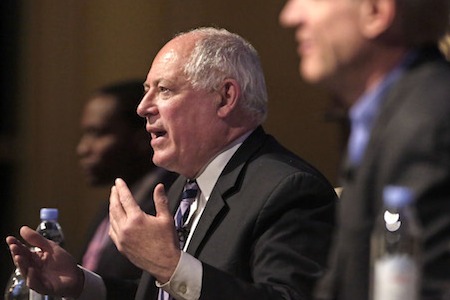
CHICAGO (AP) – Democratic Illinois Gov. Pat Quinn, fighting to hold onto his seat and his reputation as a reformer who’s cleaned up state government, is facing a steady stream of questions about a now-defunct anti-violence program he started in the run-up to his 2010 election.
On Wednesday, a bipartisan commission of lawmakers will decide whether to call a number of former Quinn administration officials to testify about the program, which a state audit recently concluded had “pervasive” problems, including misuse of funds. But federal prosecutors, who also are investigating how the funds were spent, have asked them to hold off. If they proceed, many of the former Quinn aides are expected to appear but not answer questions.
Republicans, who see the gubernatorial election this year as possibly the next best chance to win control of a Democratic leaning state, have alleged Quinn used money from the $55 million Neighborhood Recovery Initiative as a political slush fund to secure votes in predominantly minority neighborhoods of heavily Democratic Chicago in a tight race. Quinn has denied that claim and says he has “zero tolerance” for fraud or abuse. He’s defended the program’s original intent, which was to provide job training and programming in violence-plagued neighborhoods.
Regardless of whether there was any wrongdoing, the allegations alone could be damaging for Quinn, who often touts the steps he’s taken to turn Illinois around after the last two governors went to prison for corruption. His GOP rival, Bruce Rauner, meanwhile, has worked to paint Quinn as just another insider.
“The one thing (Quinn) does have and always has had is a reputation for integrity,” said Chris Mooney, a political studies professor at the University of Illinois at Springfield. “If this looks like he’s just another Chicago politician like he’s been railing against for years … that’s not good.”
Political analyst Thom Serafin, however, said it’s still too early to tell what damage if any there could be.
“You don’t know what’s there yet,” he said.
The Legislative Audit Commission oversees state audits and must approve one that concluded that the Neighborhood Recovery Initiative was hastily put together, poorly managed and had “pervasive” problems, including the misuse of funds. Quinn has said he shut down the program in 2012 when concerns about possible misspending arose.
Quinn’s office also says it has instructed all state agencies to fully support any law enforcement inquiries. Senate Republican spokeswoman Patty Schuh said Tuesday that Quinn’s office had provided members of the Legislative Audit Commission an estimated 2,000 emails linked to the program.
Quinn, who was traveling to Washington, D.C., on Wednesday for a task force on climate preparedness, signed a new state law that strengthen rules for how the state awards and oversees grants.
“What happened with the Neighborhood Recovery Initiative program was unacceptable and should never happen at any state agency,” he said in a statement. “When I learned of these issues, I took responsibility by defunding the program and shutting it down, and today I am instituting the strongest reforms in the nation.”
Prosecutors want the commission to hold off on subpoenas of seven former Quinn administration employees involved in the program, including his former chief of staff and other members of his one-time inner circle, for 90 days while they conduct their investigation. But Republicans have said they want to proceed.
A group of Chicago ministers including one whose church received funding from NRI told reporters Wednesday that they wanted the committee to suspend action so federal prosecutors could proceed. They also defended such neighborhood programs as valuable and blasted Rauner, whose campaign workers distributed anti-Quinn fliers outside the building where the hearing was taking place.
The commission is split evenly between Republicans and Democrats, and it would take a majority vote to reverse an earlier decision to call the witnesses.
Schuh said all seven witnesses are expected to attend the hearing in Chicago. Even if they are called, they could exercise their constitutional right not to answer questions.
Quinn ascended to the governor’s office in 2009 when lawmakers ousted Democratic Gov. Rod Blagojevich after Blagojevich was arrested on federal corruption charges. Quinn won his first full term in 2010, beating Republican state Sen. Bill Brady by a slim margin.